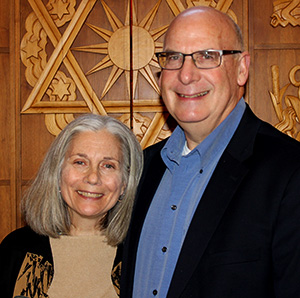Mental health issues affect one in four people, a statistic that has inspired the next frontier of synagogue inclusion. This year’s focus on mental health will come into sharp relief on May 15 when the Ruderman Synagogue Inclusion Project (RSIP) and Combined Jewish Philanthropies host “Celebrating Inclusion: Opening Doors to Jewish Community” to honor the work of current partners, affiliates and synagogue grantees. Kitty Dukakis and former governor and Democratic presidential candidate Michael Dukakis, dedicated mental health advocates, will be among those speaking at the event.
Molly Silver, RSIP director, noted, “There has been so much wonderful progress in many areas of inclusion, including synagogue ramps, bima accessibility, large-print siddurim and allergy awareness during synagogue gatherings. But one area that has lagged behind is mental health. The stigma associated with mental health issues can deter people from seeking help or even reaching out to their rabbis.” RSIP and CJP have been behind initiatives at the Massachusetts Board of Rabbis and Hebrew College that enable clergy to explore the connection between spirituality and mental health. Silver said rabbis often grapple with how to help their congregants who are struggling with mental health issues. “We wanted to give clergy and clergy-in-training a safe space to talk about Jewish pastoral care,” she said. Cynthia Piltch, Ph.D., a health educator who is also trained in alternative medicine, has trailblazed the way for including mental health as a priority for synagogues to address. Piltch and her husband, Jamie W. Katz, will join the Dukakises on May 15 in a discussion moderated by Sarah Abramson, CJP’s vice president of caring, community impact and strategic partnerships. Piltch’s mental health advocacy begins with her own story. Over two decades ago, Piltch had the first of two depressive episodes that left her hospitalized. She tried an array of medications that did nothing to lift her depression. Piltch recently told JewishBoston that “the only treatment that saved my life was electroconvulsive therapy, or ECT, and I had to fight to receive it. Everybody has the right to direct his or her own health. Why did I have to go through 12 medications before I convinced the doctors all those years ago that I needed ECT?” Eight years ago, Piltch went through a second depressive episode. At the time, she made a decision that would change her life. “I realized I had a choice,” she said. “I could continue to feel ashamed and keep [my depression] a secret to maintain my career, or I could come out of the closet. I not only came out of the closet, I made the decision that although depression was a part of me, it didn’t define me.” That second depressive episode also brought her into contact with Kitty Dukakis. Dukakis had written a memoir about her mental health struggles. Her latest book, “Shock: The Healing Power of Electroconvulsive Therapy,” inspired Piltch to reach out to her. “After that second depressive episode,” said Piltch, “I read Kitty’s book. I didn’t know her, but I somehow found the courage to call her up.” The Dukakises had just started an ECT support group called ECT: A Light in the Darkness and invited Piltch to join the group. Piltch went on to lead a monthly support group at McLean Hospital for people who have had ECT treatments. She is careful to make the distinction that, “I’m not advocating for treatment, but advocating for support for people who have had ECT treatment.” Piltch, a Reiki master teacher and massage therapist, also brings that skillset to help ECT patients. “I want to bring Reiki to people with mental health as well as physical issues,” she said. “I have always seen that mental and physical health are interrelated.” During her second depressive episode, Piltch brought in her rabbi, Howard Jaffe of Temple Isaiah in Lexington, to counsel her. “I asked him how many times he visited people for mental health issues, and he replied, ‘Not enough,’” she said. She vowed that after that hospital stay she would start a mental health initiative at Temple Isaiah. She said that six months later, “I knocked on Howard Jaffe’s door and said, ‘I’m ready. Are you ready?’” Soon after she was the head of the Temple Isaiah Mental Health Initiative. “This was something I was called to do,” she said. “This is a Jewish issue. Like everyone else, Jews have mental health challenges. We can’t hang our heads in shame and pretend everything else is OK.” Over the past two years, Piltch has organized two major events at Temple Isaiah. Last year she planned a program on eating disorders. Over 200 people from the temple turned out for the event. “Either people are dealing with an eating disorder or they are the parent of someone who has an eating disorder,” she said. “It was a milestone for me that we were owning this issue for people.” This year Piltch and her committee presented a program on spirituality and mental health. The event was open to other congregations and churches and more than 300 people were in attendance. On the program was a temple member who spoke about being the child of a schizophrenic. “We frame our educational events so there is someone with lived experience sharing his or her story,” noted Piltch. “I’ve seen an enormous change in how often people are coming forward. Prevention is everything, and we need to be working with folks early on in their mental health journey.” For more information and to register by May 7 for Celebrating Inclusion, please click here.
Related






